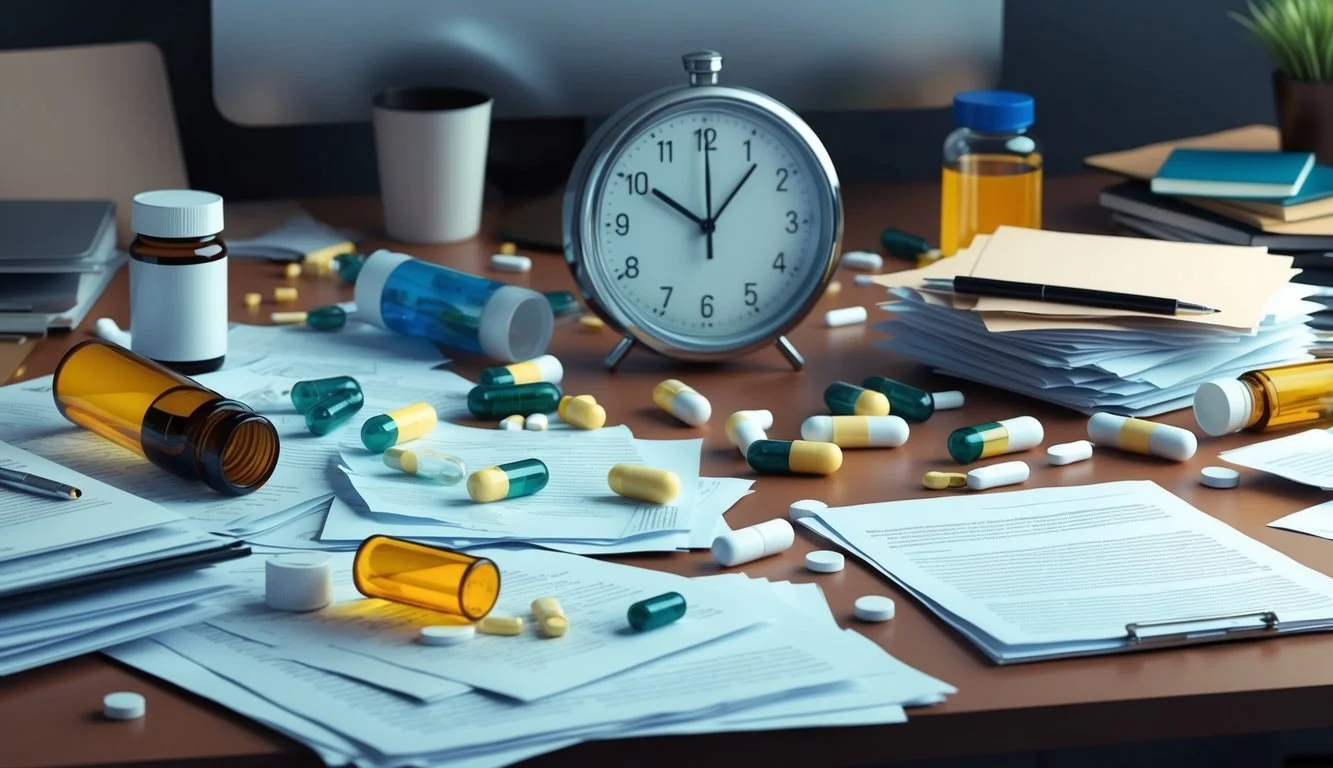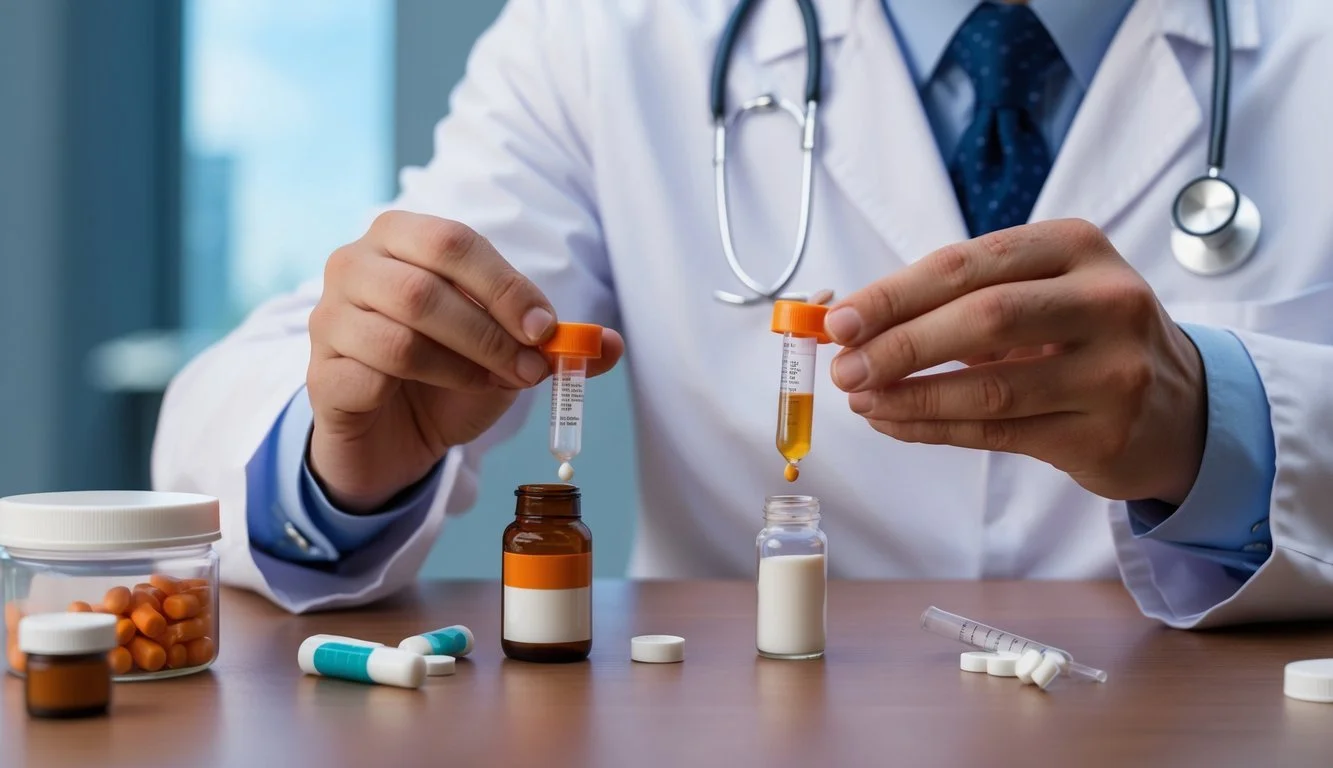Finding the Best ADHD Med for Impulsivity: Key Options and Considerations
Impulsivity can be a challenging symptom for many individuals with Attention Deficit Hyperactivity Disorder (ADHD). Finding the right medication to manage this aspect of ADHD is crucial for improving daily functioning and quality of life.
Stimulant medications, particularly methylphenidate and amphetamine-based drugs, are often considered the most effective for treating impulsivity in ADHD. These medications work by increasing dopamine and norepinephrine levels in the brain, helping to improve focus and reduce impulsive behaviors.
For those who don't respond well to stimulants or experience unwanted side effects, non-stimulant options like atomoxetine may be beneficial. Some healthcare providers also prescribe antidepressants off-label to address impulsivity in ADHD patients. The choice of medication depends on individual factors, including the severity of symptoms, potential side effects, and overall health profile.
Understanding ADHD and Impulsivity
Attention-deficit/hyperactivity disorder (ADHD) is a complex neurodevelopmental condition characterized by inattention, hyperactivity, and impulsivity. Impulsivity in ADHD manifests as acting without thinking, difficulty controlling immediate reactions, and a tendency to seek instant gratification.
Causes of ADHD-Related Impulsivity
Impulsivity in ADHD stems from differences in brain structure and function. Neuroimaging studies have revealed reduced activity in the prefrontal cortex, which is responsible for executive functions like impulse control.
Neurotransmitter imbalances, particularly in dopamine and norepinephrine systems, contribute to impulsive behaviors. These chemical messengers play crucial roles in regulating attention, motivation, and reward processing.
Genetic factors also influence ADHD-related impulsivity. Research has identified several genes associated with impulse control and neurotransmitter regulation.
Environmental factors, such as prenatal exposure to toxins or early childhood adversity, may exacerbate impulsive tendencies in individuals with genetic predispositions to ADHD.
Impact on Daily Life
Impulsivity can significantly affect various aspects of daily functioning for individuals with ADHD. In social situations, it may lead to interrupting others, blurting out inappropriate comments, or difficulty waiting one's turn.
At work or school, impulsivity can result in rushed decision-making, difficulty following instructions, and challenges with time management. This can impact job performance and academic achievement.
Financial management often suffers due to impulsive spending habits and difficulty delaying gratification. Individuals may struggle with budgeting and saving for long-term goals.
Impulsivity can also affect personal relationships, leading to conflicts and misunderstandings. Impulsive reactions may strain friendships, romantic partnerships, and family dynamics.
In more severe cases, ADHD-related impulsivity can contribute to risk-taking behaviors, such as reckless driving or substance abuse, potentially jeopardizing personal safety and well-being.
Assessment of ADHD Medications
ADHD medications are evaluated based on specific criteria to determine their effectiveness in managing symptoms like impulsivity. Different types of medications target various neurotransmitter systems in the brain to alleviate ADHD symptoms.
Criteria for Evaluating Medications
Efficacy in symptom reduction is a key criterion for assessing ADHD medications. Clinical trials measure improvements in attention, hyperactivity, and impulsivity. Safety and side effect profiles are crucial considerations, with common side effects including appetite changes and sleep disturbances.
Onset and duration of action are important factors. Some medications work quickly but require multiple daily doses, while others provide extended coverage. Tolerability and potential for abuse or dependence are also evaluated.
Patient characteristics like age, comorbid conditions, and individual response patterns influence medication selection. Cost and insurance coverage can impact accessibility and long-term adherence to treatment.
Different Types of ADHD Medicines
Stimulants are the most commonly prescribed ADHD medications. They include methylphenidate (Ritalin, Concerta) and amphetamines (Adderall, Vyvanse). These drugs increase dopamine and norepinephrine levels in the brain, improving focus and reducing impulsivity.
Non-stimulant options include atomoxetine (Strattera), a norepinephrine reuptake inhibitor. It can be effective for those who don't respond well to stimulants or have concerns about their potential for abuse.
Alpha-2 agonists like guanfacine (Intuniv) and clonidine (Kapvay) are sometimes used, particularly for managing hyperactivity and impulsivity. They work by affecting norepinephrine signaling in the prefrontal cortex.
Antidepressants, such as bupropion, may be prescribed off-label for ADHD, especially when mood disorders are present alongside ADHD symptoms.
Stimulant Medications
Stimulant medications are the most commonly prescribed treatments for ADHD. They work by increasing levels of certain neurotransmitters in the brain, helping to improve focus and reduce impulsivity.
Methylphenidate Based Treatments
Methylphenidate is a widely used stimulant for managing ADHD symptoms, including impulsivity. It comes in various formulations like Ritalin, Concerta, and Focalin.
Short-acting versions typically last 3-4 hours, while extended-release formulations can provide symptom relief for up to 12 hours. Methylphenidate works by blocking the reuptake of dopamine and norepinephrine in the brain.
Common side effects may include decreased appetite, sleep difficulties, and irritability. Dosages are usually started low and gradually increased to find the optimal therapeutic effect.
Amphetamine Based Treatments
Amphetamine-based medications are another class of stimulants used to treat ADHD and impulsivity. Popular options include Adderall, Vyvanse, and Dexedrine.
These medications increase the release of dopamine and norepinephrine in the brain. Adderall is available in immediate-release and extended-release forms, while Vyvanse is a long-acting prodrug.
Amphetamines can be effective for 4-14 hours, depending on the formulation. Potential side effects include dry mouth, weight loss, and increased heart rate.
As with methylphenidate, dosages are typically adjusted gradually to find the right balance of symptom relief and minimal side effects.
Non-Stimulant Medications
Non-stimulant medications offer alternative treatment options for ADHD-related impulsivity. These medications work through different mechanisms than stimulants and can provide steady symptom control throughout the day.
Atomoxetine
Atomoxetine, sold under the brand name Strattera, is a selective norepinephrine reuptake inhibitor. It increases norepinephrine levels in the brain, improving attention and reducing impulsive behaviors.
Atomoxetine is taken once or twice daily and can be effective for both children and adults with ADHD. It may take several weeks to reach full effectiveness.
Common side effects include nausea, decreased appetite, and fatigue. Atomoxetine carries a lower risk of abuse potential compared to stimulant medications.
Alpha-2 Adrenergic Agents
Guanfacine (Intuniv) and clonidine (Kapvay) are alpha-2 adrenergic agonists used to treat ADHD-related impulsivity. These medications work by stimulating receptors in the prefrontal cortex, enhancing attention and impulse control.
Guanfacine and clonidine are available in extended-release formulations, allowing for once-daily dosing. They can be particularly helpful for individuals with comorbid tic disorders or anxiety.
Side effects may include drowsiness, dry mouth, and dizziness. These medications can also affect blood pressure, so regular monitoring is important.
Alpha-2 adrenergic agents are often used as adjunct treatments with stimulants or as monotherapy in patients who cannot tolerate stimulants.
Therapeutic Effects
ADHD medications can significantly improve impulsivity symptoms and overall functioning in individuals with ADHD. These medications work by targeting specific neurotransmitters in the brain.
Improvements in Impulse Control
Stimulant medications like methylphenidate and amphetamines are highly effective for reducing impulsivity in ADHD. They increase dopamine and norepinephrine levels in the brain, enhancing focus and self-control.
Non-stimulant options such as atomoxetine also show promise in managing impulsive behaviors. These medications work more gradually but can provide steady symptom relief throughout the day.
Many individuals report better decision-making abilities and reduced risk-taking behaviors when taking ADHD medication. This can lead to improved relationships, academic performance, and workplace productivity.
Overall Efficacy and Effectiveness
ADHD medications demonstrate high efficacy rates, with 70-80% of patients experiencing significant symptom improvement. Stimulants often show rapid effects, sometimes within hours of the first dose.
Long-acting formulations provide sustained symptom control throughout the day. This consistent coverage helps maintain focus and impulse control in various settings.
Combination therapy, using both medication and behavioral interventions, often yields the best results. This approach addresses both the neurological and psychological aspects of ADHD.
Regular monitoring and dose adjustments ensure optimal therapeutic effects. Healthcare providers work closely with patients to find the right medication and dosage for individual needs.
Potential Side Effects
ADHD medications can cause various side effects, both short-term and long-term. These effects range from mild discomfort to more serious health concerns.
Short-Term Side Effects
Common short-term side effects of ADHD medications include decreased appetite, trouble sleeping, headaches, and stomach aches. These symptoms often occur early in treatment and may resolve as the body adjusts to the medication.
Some individuals may experience mood changes, irritability, or increased anxiety. Dry mouth, nausea, and dizziness are also possible.
In rare cases, more severe side effects like rapid heartbeat or significant blood pressure changes may occur. These require immediate medical attention.
Long-Term Health Considerations
Long-term use of ADHD medications may lead to growth suppression in children. Regular monitoring of height and weight is crucial during treatment.
Cardiovascular health is another concern. Some studies suggest a potential increased risk of heart problems, especially in adults with pre-existing conditions.
Prolonged stimulant use might affect mental health, potentially exacerbating anxiety or mood disorders in some individuals.
Tolerance development is possible, leading to decreased medication effectiveness over time. This may necessitate dosage adjustments or medication changes.
Regular check-ups and open communication with healthcare providers are essential to manage and mitigate long-term health risks associated with ADHD medications.
Patient-Centered Treatment Planning
Effective ADHD treatment requires tailoring medication choices and therapeutic approaches to each individual's unique needs and circumstances. A collaborative approach between patients and healthcare providers leads to better outcomes and treatment adherence.
Individualizing Medication Choices
Selecting the most appropriate ADHD medication for impulsivity involves careful consideration of several factors. These include the patient's age, overall health status, severity of symptoms, and potential side effects. Stimulant medications like methylphenidate and amphetamines are often first-line treatments due to their efficacy in managing impulsivity.
For some patients, non-stimulant options may be preferable. These include atomoxetine, guanfacine, and bupropion. Each medication has a unique profile of benefits and potential side effects.
Regular follow-ups allow for dose adjustments and medication changes if needed. Healthcare providers monitor treatment response and adjust the regimen accordingly.
Incorporating Patient Preferences
Patient input is crucial in developing an effective treatment plan. Open discussions about treatment goals, lifestyle factors, and concerns help shape medication choices and therapeutic strategies.
Some patients may prefer long-acting formulations for convenience, while others might opt for shorter-acting medications for more flexible dosing. Cost considerations and insurance coverage also play a role in medication selection.
Non-pharmacological approaches, such as cognitive behavioral therapy, can complement medication treatment. Patients may choose to incorporate these strategies based on their preferences and needs.
Regular communication between patients and healthcare providers ensures that treatment remains aligned with patient goals and values throughout the course of care.
Behavioral and Lifestyle Interventions
Non-pharmacological approaches can significantly improve ADHD symptoms, especially impulsivity. These methods focus on developing skills and making lifestyle changes to enhance self-control and reduce impulsive behaviors.
Cognitive Behavioral Therapy
Cognitive Behavioral Therapy (CBT) is a structured approach that helps individuals with ADHD identify and change negative thought patterns and behaviors. It teaches practical skills to manage impulsivity and improve daily functioning.
CBT sessions often involve setting goals, problem-solving, and learning time management techniques. Therapists work with patients to develop strategies for controlling impulses and improving decision-making.
One key aspect of CBT for ADHD is learning to recognize triggers for impulsive behavior. Patients practice techniques like pausing before acting and considering consequences.
CBT can be particularly effective when combined with medication. It provides tools to cope with residual symptoms and build long-term management skills.
Diet and Exercise
Nutrition and physical activity play important roles in managing ADHD symptoms, including impulsivity. A balanced diet rich in omega-3 fatty acids, protein, and complex carbohydrates may help stabilize mood and improve focus.
Some individuals find that reducing sugar and artificial additives in their diet leads to better impulse control. It's important to maintain consistent meal times to avoid blood sugar fluctuations that can exacerbate symptoms.
Regular exercise has been shown to reduce impulsivity and improve attention in people with ADHD. Activities like running, swimming, or team sports can help channel excess energy and boost mood-regulating neurotransmitters.
Mindfulness exercises and yoga can also be beneficial. These practices teach present-moment awareness and self-regulation skills that can help manage impulsive urges.
Monitoring and Adjusting Treatment
Regular check-ins with a healthcare provider are crucial when taking ADHD medication for impulsivity. Patients should report any side effects promptly to their doctor.
Common issues include sleep disturbances, appetite changes, and mood fluctuations. Healthcare providers may need to adjust dosages or switch medications to minimize adverse effects.
The effectiveness of ADHD medications can vary over time. Periodic assessments help determine if the current treatment is still working optimally.
Monitoring may involve:
Tracking symptom changes
Assessing behavioral improvements
Evaluating academic or work performance
Checking vital signs and weight
Adjustments to medication regimens are often necessary. Factors that may require changes include:
Age and body weight changes
Development of tolerance
Emergence of new symptoms
Life transitions (e.g., starting college or a new job)
Combining medication with behavioral therapies often yields the best results. This approach addresses both neurochemical imbalances and learned behaviors associated with ADHD.
Patients and caregivers should maintain open communication with healthcare providers. This collaboration ensures the treatment plan remains tailored to individual needs and goals.




